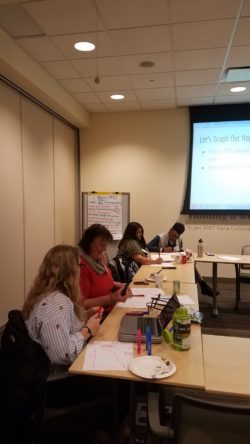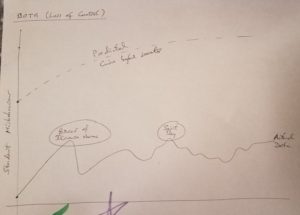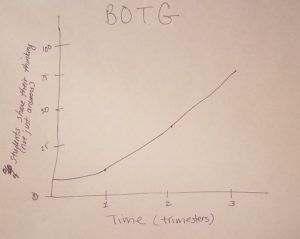 The focus for our workgroup is now shifting to explore how we can speed the adoption of meaningful discourse/Number Talks within schools. If we want to scale an effective practice, we need to get beyond simply asking (or telling) teachers to use the practice because it is effective. As teachers plan their lessons, they need to balance a number of competing forces. For Number Talks to be part of their solution, we need to understand those forces, and set up the conditions where the regular inclusion of Number Talks becomes the easy choice for them to make. This will be the focus of our two day workshop at the Systems Thinking Institute next week.
The focus for our workgroup is now shifting to explore how we can speed the adoption of meaningful discourse/Number Talks within schools. If we want to scale an effective practice, we need to get beyond simply asking (or telling) teachers to use the practice because it is effective. As teachers plan their lessons, they need to balance a number of competing forces. For Number Talks to be part of their solution, we need to understand those forces, and set up the conditions where the regular inclusion of Number Talks becomes the easy choice for them to make. This will be the focus of our two day workshop at the Systems Thinking Institute next week.
Our February workgroup meeting was a chance to start down this path.
We began our session with a clip from Clayton Christensen, the Harvard professor who coined the term “disruptive innovation”. In this clip, he describes work he and his colleagues did to get a handle on why so many milkshakes are sold to commuters in the morning. The key insight was not to look at the demographics of the buyer, but asking what problem they were buying the milkshake to solve — the “Job to be Done”. In the case of this group of commuters, the Job to be Done was to give them something to do on a long commute, not leave them hungry by 10:00 in the morning, and not make a mess on the way. As Christensen puts it, by understanding the requirements of the Job to be Done, we can craft solutions that allow customers to pull the solution into their lives.
To start down the path to understand the forces that guide the decisions teachers make when planning a lesson, Danielle Robinson, the Math Interventionist for Brown Street Academy led our group through an exploration of the hopes and fears they hold around Number Talks.
Our big question: How can we facilitate meaningful math discourse in our classroom?
 What do you hope will happen when you implement math discourse in your classroom?
What do you hope will happen when you implement math discourse in your classroom?
- Kids help teach each other, and are excited about learning
- Increased conceptual understanding
- Increased student to student relationships
- Build confidence in their math identity
- Teachers would have better understanding of math learning process
- Evidence-based conversations
- Students make their own connections
- Increased student engagement
- Students learning multiple strategies from each other
- Disagreement and testing new ideas
- Teachers utilize feedback/take in student reactions
- School-level, better attention paid to increased comprehension of math principles
- Collect evidence
- Inter-grade coherence
- Raises the visibility of ah-ha moments for students
- Coherence between subjects
- Equity
- Build community (students feel safe enough to share their thinking)
- Students build relationships with each other
- Learn to disagree respectfully
 What do you fear will happen when you implement discourse in your classroom?
What do you fear will happen when you implement discourse in your classroom?
- Non-stop discourse
- Students get off-topic
- If a teacher can’t properly define meaningful/productive discourse
- Teacher will not value discourse/only values certain students discourse
- Loss of Equity of voice
- Teacher compliance vs. fidelity
- If a principal wants discourse in a building, but how do they support
- Fear of lacking support in the school
- Students not becoming fluent in skills
- Discourse time inconsistent with test time, basically how do you test learning
- Difficult to measure the results of math discourse
- Grading can be difficult, in terms of what a teacher values
Danielle asked the group to pick key hopes and fears for meaningful discourse and graph how they expected what they hoped for/feared would change over time. Across the group, the top fears centered on classroom management issues. The top hope was that students would share their thinking rather than just their answers.
Testing this process with the workgroup has given us a sense of what we might expect in our Institute Workshop. In that longer session we’ll be working with Danielle to further explore the factors that drive teachers’ decisions around the practices they incorporate. We’ll look for common themes and identify measures one might that can make meaningful discourse a solution teachers want to pull into their lesson plans.

